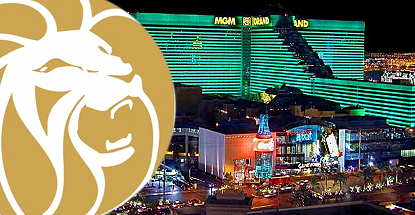 Casino operator MGM Resorts‘ profit rose nearly two-thirds in Q1 despite a double-digit revenue decline.
Casino operator MGM Resorts‘ profit rose nearly two-thirds in Q1 despite a double-digit revenue decline.
Revenue in the three months ending March 31 fell 11.3% to $2.33b but net income rose 65% to $169.9m. Total gaming revenue was down 19% to $1.28b while most non-gaming revenue streams were up slightly – except entertainment, which fell 6% due to “a decrease in in-house shows and timing of certain arena events.”
Revenue from MGM’s wholly owned domestic resorts came to $1.6b, up half a percentage point from the same period last year. Slots revenue and handle were up 5% and 9% respectively while table game hold percentage fell 0.7 points to 20.1%. CFO Dan D’Arrigo said Q1 was negatively impacted by high rollers opting to delay their trips to Vegas to coincide with last weekend’s Mayweather v. Pacquiao tilt at the MGM Grand.
MGM’s 50% share of Atlantic City’s Borgata property came to $12m while its share of the CityCenter property in Vegas added $101m. This latter figure was up more than seven-fold from 2014 due to a financial settlement with a developer. Absent this one-off, MGM’s CityCenter haul was a more modest $22m, although this would still represent an over 50% year-on-year improvement.
MGM RETAINS “OUTSIZED” MACAU MARKET SHARE
MGM China revenue fell 33% to $630m, earnings dipped 38% to $148m and operating income slumped 56% to $72m. VIP table game revenue and turnover fell 45% and 51% respectively, while hold improved 0.3 points to 3.3%. Despite the declines, MGM China CEO Grant Bowie said the company had retained its “outsized” 10% market share.
Mass market table revenue fell a much less debilitating 13%. Bowie said 44 gaming tables had been moved from VIP rooms to the main floor in Q1, upping the mass allocation to 55% of MGM’s total. Bowie said the mass market now accounted for 50% of MGM Macau’s revenue and approximately 80% of earnings.
MAYWEATHER V. PACQUIAO BRINGS IN THE HIGH-ROLLERS
On the analyst call, MGM CEO Jim Murren said the Mayweather fight had been an enormous success, with an equally dramatic effect on the gaming front. While full results won’t be made public until MGM’s Q2 report, Murren said room revenue had risen 30% and there’d been “record front money coming in, tremendous drop in our properties from a very diverse and global group of players. And a lot of those players are still here.” (Perhaps they’re waiting for a real fight to break out?)
Murren said the fight had resulted in over 500 planes parked at Atlantic Aviation, the private terminal at Las Vegas’ McCarran International Airport. Murren said the previous record was 350 during a Super Bowl weekend. Murren marveled at “how they shoehorned these planes” on the tarmac.
MGM says its in-development arena on the Las Vegas Strip was advancing “incredibly quickly” and should open up ‘in less than a year.” Over half of the venue’s luxury suites have already been spoken for and another 30% are being negotiated.
Murren also addressed recent efforts by dissident shareholder Jonathan Litt, who has been pressing for MGM to (a) replace four board members with his own nominees and (b) follow some of its US competitors in morphing into a real estate investment trust (REIT). Late last month, Litt publicly suggested MGM’s current expansion in Massachusetts, Maryland and Macau threatened the company’s solvency.
Murren said MGM was exploring a REIT structure but there was no guarantee the company would follow through. Murren added that he regretted that the situation with Litt had “devolved into a tabloid like campaign and it shouldn’t happen.”
